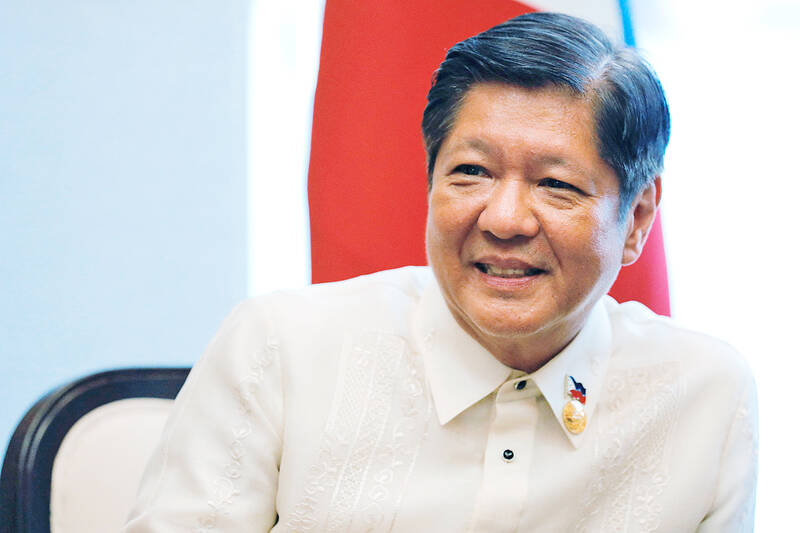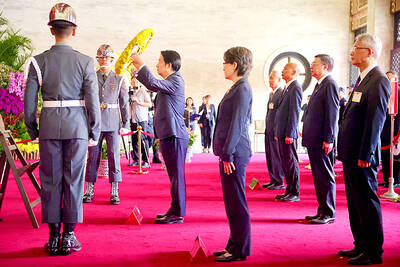The Philippine government would take back control, if needed, of the company that runs the nation’s power transmission network partly owned by State Grid Corp of China (國家電網), Philippine President Ferdinand Marcos Jr’s office said.
Marcos met with Philippine Senator Raffy Tulfo who heads a committee investigating the situation at National Grid Corp of the Philippines (NGCP) following recent incidents of power outages in the Southeast Asian country.
Marcos backed Tulfo’s proposal to “conduct a comprehensive study or hold hearings,” Marcos’ communications office said in a statement posted on its Facebook page on Wednesday.

Photo: Reuters
Tulfo “aimed to examine the security aspect, particularly on who truly controls the corporation,” the statement said.
“If necessary, the government will take back control of the entity,” it said.
China’s State Grid has a 40 percent stake in NGCP after winning, with other investors, a 25-year concession to run the Southeast Asian country’s power transmission network in 2007.
The remaining 60 percent is held by Philippine investors including Synergy Grid & Development Phils Inc president Henry Sy Jr and Prudential Guarantee & Assurance Inc chairman Robert Coyiuto Jr.
Chinese Ministry of Foreign Affairs spokesman Wang Wenbin (汪文斌) did not directly respond to a question on the Philippines’ plans when asked during a regular briefing in Beijing.
“China supports Chinese companies in expanding cooperation with the Philippine side and achieving mutually beneficial results,” Wang said, adding that Manila is a “friendly partner” of Beijing.
Previous efforts by officials for the government to reclaim control of power grid operations did not prosper and the Philippine Department of Energy has proposed to amend a 2001 law to ban foreign-owned or foreign government-backed enterprises from engaging in power transmission.
At a hearing of the energy committee on Wednesday, Philippine Senator Risa Hontiveros said they might need to scrutinize “not just China’s control of NGCP, but the performance of the company itself,” adding that “this time we might need to see if we have to revoke its franchise.”
NGCP is “ready to answer any and all questions raised concerning how we do business,” company spokesperson Cynthia Alabanza said, adding that the firm had invested 300 billion pesos (US$5.38 billion) to strengthen the transmission system.
Separately, Australian Minister for Foreign Affairs Penny Wong (黃英賢) said her country would provide surveillance drones and other high-tech gear to the Philippine Coast Guard and is considering whether to take part in joint patrols in the disputed South China Sea.
Wong, who held talks in Manila with Philippine Secretary of Foreign Affairs Enrique Manalo, also thanked the Philippine government for its help in the discovery of a ship that sank during World War II in the northern Philippines, killing nearly 1,000 Australians “in a very sad chapter in our history.”
The US and the Philippines, which are longtime treaty allies, have been holding talks on proposed joint naval patrols in the South China Sea, where China has fortified its vast territorial claims by transforming disputed reefs into missile-protected island bases and deploying Chinese Coast Guard and militia ships on constant patrols.
Aside from China and the Philippines, Taiwan, Vietnam, Malaysia and Brunei are also embroiled in the territorial disputes.
Additional reporting by AP

RESPONSE: The transit sends a message that China’s alignment with other countries would not deter the West from defending freedom of navigation, an academic said Canadian frigate the Ville de Quebec and Australian guided-missile destroyer the Brisbane transited the Taiwan Strait yesterday morning, the first time the two nations have conducted a joint freedom of navigation operation. The Canadian and Australian militaries did not immediately respond to requests for comment. The Ministry of National Defense declined to confirm the passage, saying only that Taiwan’s armed forces had deployed surveillance and reconnaissance assets, along with warships and combat aircraft, to safeguard security across the Strait. The two vessels were observed transiting northward along the eastern side of the Taiwan Strait’s median line, with Japan being their most likely destination,

‘NOT ALONE’: A Taiwan Strait war would disrupt global trade routes, and could spark a worldwide crisis, so a powerful US presence is needed as a deterrence, a US senator said US Senator Deb Fischer on Thursday urged her colleagues in the US Congress to deepen Washington’s cooperation with Taiwan and other Indo-Pacific partners to contain the global security threat from China. Fischer and other lawmakers recently returned from an official trip to the Indo-Pacific region, where they toured US military bases in Hawaii and Guam, and visited leaders, including President William Lai (賴清德). The trip underscored the reality that the world is undergoing turmoil, and maintaining a free and open Indo-Pacific region is crucial to the security interests of the US and its partners, she said. Her visit to Taiwan demonstrated ways the

GLOBAL ISSUE: If China annexes Taiwan, ‘it will not stop its expansion there, as it only becomes stronger and has more force to expand further,’ the president said China’s military and diplomatic expansion is not a sole issue for Taiwan, but one that risks world peace, President William Lai (賴清德) said yesterday, adding that Taiwan would stand with the alliance of democratic countries to preserve peace through deterrence. Lai made the remark in an exclusive interview with the Chinese-language Liberty Times (sister paper of the Taipei Times). “China is strategically pushing forward to change the international order,” Lai said, adding that China established the Asia Infrastructure Investment Bank, launched the Belt and Road Initiative, and pushed for yuan internationalization, because it wants to replace the democratic rules-based international

WAR’S END ANNIVERSARY: ‘Taiwan does not believe in commemorating peace by holding guns,’ the president said on social media after attending a morning ceremony Countries should uphold peace, and promote freedom and democracy, President William Lai (賴清德) said yesterday as Taiwan marked 80 years since the end of World War II and the Second Sino-Japanese War. Lai, Vice President Hsiao Bi-khim (蕭美琴) and other top officials in the morning attended a ceremony at the National Revolutionary Martyrs’ Shrine in Taipei’s Zhongshan District (中山) to honor those who sacrificed their lives in major battles. “Taiwanese are peace-loving. Taiwan does not believe in commemorating peace by holding guns,” Lai wrote on Facebook afterward, apparently to highlight the contrast with the military parade in Beijing marking the same anniversary. “We